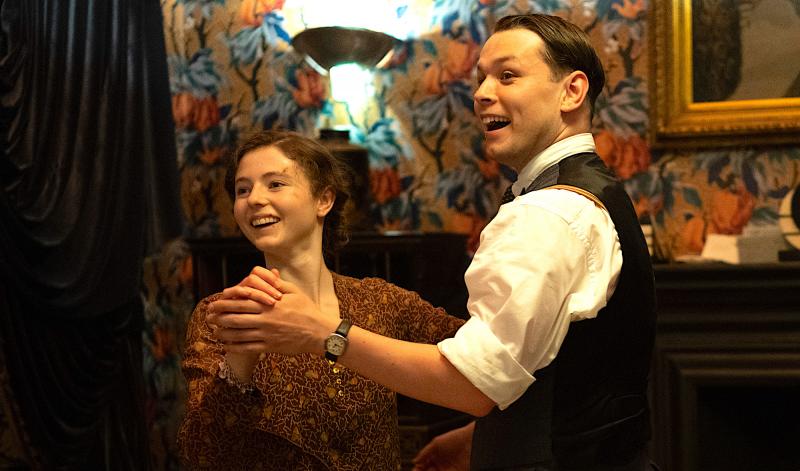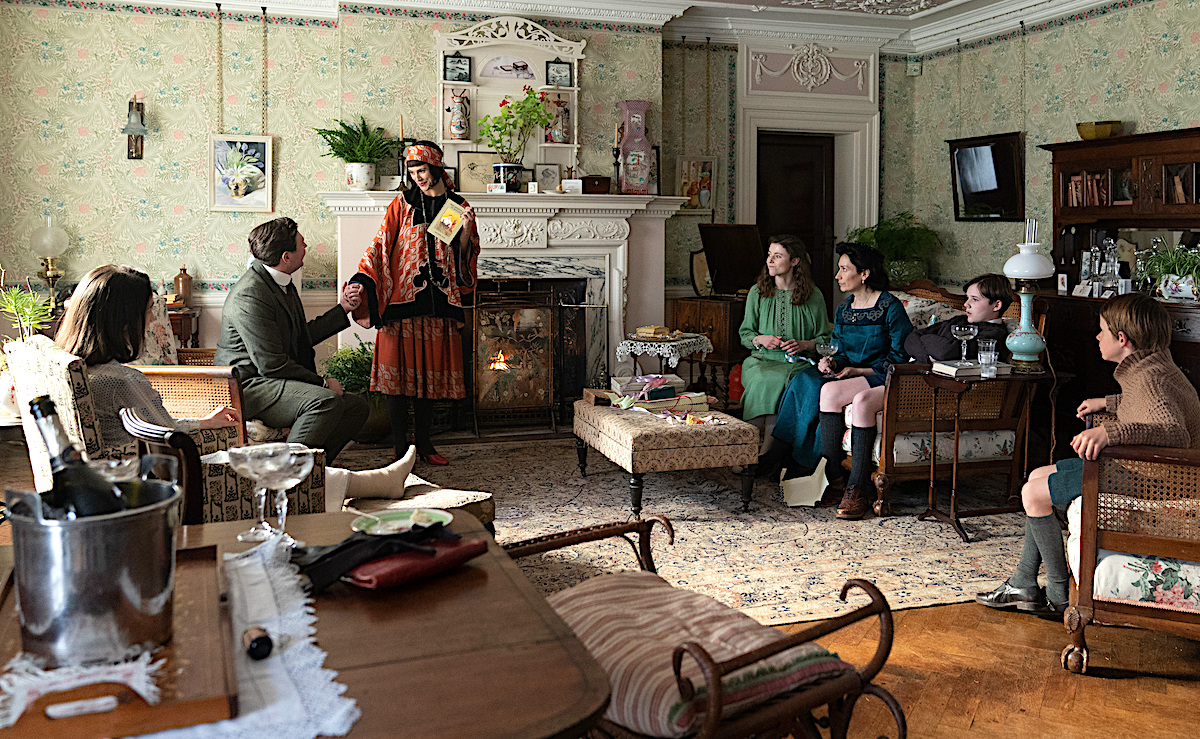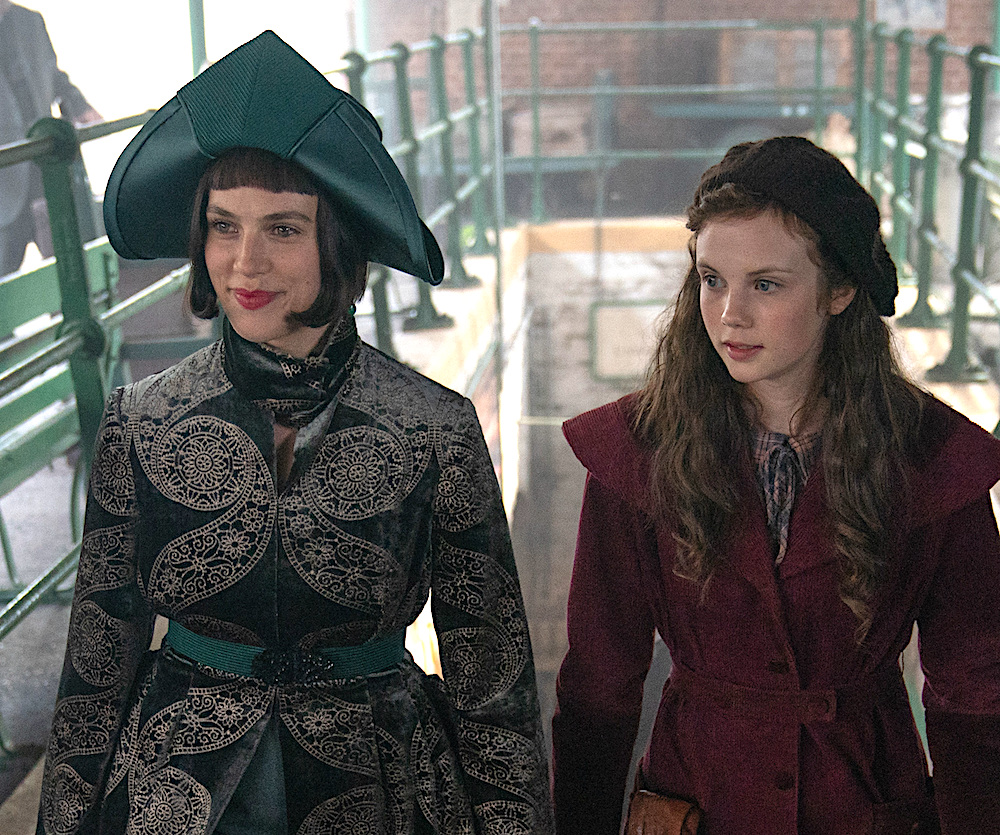Life After Life, BBC Two review - déjà vu all over again | reviews, news & interviews
Life After Life, BBC Two review - déjà vu all over again
Life After Life, BBC Two review - déjà vu all over again
Fine adaptation of Kate Atkinson's novel is touching and profound

If we could keep living our life over and over again, would we get better at it? This is the premise underpinning Life After Life, the BBC’s four-part adaptation of Kate Atkinson’s novel.
The story centres around Ursula Todd, as she grows up with parents Hugh and Sylvie (James McArdle and Sian Clifford) and assorted siblings in their home, Fox Corner. It’s an Edwardian rural idyll of lush gardens, the murmur of bees and teas on the lawn.
But Ursula’s progress through the 20th century and through multiple versions of her life will not be plain sailing. Indeed, her first attempt at being born finds her choked to death by her umbilical cord, though she’s saved on the second try by the brisk intervention of the local doctor with a pair of scissors. Her hectic childhood is further scarred by being drowned in the sea and falling fatally out of a window. Later, she dies in the 1918 Spanish flu epidemic, but is soon back to have another go (the Todd family, pictured below). All of this leaves Ursula with a recurring sense of déjà vu, as if she can sense what’s happening to her but can never fully grasp it. Her mother, concerned about her fretful mental state after Ursula pushes the family’s Irish maid Bridget down the stairs – it was Bridget who brought the flu into the house to terminate Ursula’s previous innings, so there is instinctive method in her mania – sends her to see a psychiatrist, Dr Kellet (John Hodgkinson). He provides a kind of framework for Ursula’s strange destiny, refusing to give dogmatic answers to her questions – maybe she really did live previous lives, he reasons, or perhaps her déjà vu episodes are just a quirk of the process of memory, but we’ll never know. It is he, too, who gets Ursula to think about the Hindu concept of reincarnation and going through enough cycles of rebirth to achieve enlightenment. Bill Murray did it in Groundhog Day.
All of this leaves Ursula with a recurring sense of déjà vu, as if she can sense what’s happening to her but can never fully grasp it. Her mother, concerned about her fretful mental state after Ursula pushes the family’s Irish maid Bridget down the stairs – it was Bridget who brought the flu into the house to terminate Ursula’s previous innings, so there is instinctive method in her mania – sends her to see a psychiatrist, Dr Kellet (John Hodgkinson). He provides a kind of framework for Ursula’s strange destiny, refusing to give dogmatic answers to her questions – maybe she really did live previous lives, he reasons, or perhaps her déjà vu episodes are just a quirk of the process of memory, but we’ll never know. It is he, too, who gets Ursula to think about the Hindu concept of reincarnation and going through enough cycles of rebirth to achieve enlightenment. Bill Murray did it in Groundhog Day.
With a screenplay by Atkinson and Bathsheba Doran, and directed with painterly skill and a silky touch by John Crowley, Life After Life achieves its seemingly unreachable goals by anchoring its philosophical ambitions (and potentially preposterous string of deaths and resurrections) with some wonderful performances and absorbing narrative themes. Several performers play the different ages of Ursula, all of them excellent but with Thomasin McKenzie sticking most mesmerisingly in the mind as she embodies the young-adult Ursula, battling through a string of punishingly painful experiences. In one life-strand, she’s raped by an American called Howie, a friend from Oxford University of her older brother Maurice. The event and a subsequent abortion arranged by her dazzling Aunt Izzie (a champagne-fizzing performance from Jessica Brown Findlay) pitch her into a calamitous spiral of hard drinking and a terrible marriage to a psychotic con-man called Derek (pictured below, Brown Findlay and Isla Johnston as young Ursula).
 However, on her next circuit she’s able to fend off Howie with a slap in the face, and is launched on a new life-cycle which takes her to Bavaria. Here she experiences two versions of a love affair with a German boy, Jurgen (Louis Hofman), one in which he’s pro-Nazi and another in which he’s anti-Hitler. But Good Jurgen dies in an air raid, as does Ursula’s much-loved brother Teddy (Sean Delaney), shot down in his RAF bomber over Berlin.
However, on her next circuit she’s able to fend off Howie with a slap in the face, and is launched on a new life-cycle which takes her to Bavaria. Here she experiences two versions of a love affair with a German boy, Jurgen (Louis Hofman), one in which he’s pro-Nazi and another in which he’s anti-Hitler. But Good Jurgen dies in an air raid, as does Ursula’s much-loved brother Teddy (Sean Delaney), shot down in his RAF bomber over Berlin.
What does it all mean? Are our lives governed by an inscrutable, unknowable fate or some divine being, or is it all just chance and happenstance? Ursula’s older sister Pamela (Patsy Ferran) is in the latter camp – “a thing leads to a thing leads to a thing…” Her father Hugh, somehow serenely unscathed by his nightmarish experiences in the Great War, doesn’t say much, but he has found his own answer. “Take care of each other – that’s all I ask.” This is a drama that will haunt you, like a recurring dream.
rating
Share this article
The future of Arts Journalism
You can stop theartsdesk.com closing!
We urgently need financing to survive. Our fundraising drive has thus far raised £33,000 but we need to reach £100,000 or we will be forced to close. Please contribute here: https://gofund.me/c3f6033d
And if you can forward this information to anyone who might assist, we’d be grateful.

Subscribe to theartsdesk.com
Thank you for continuing to read our work on theartsdesk.com. For unlimited access to every article in its entirety, including our archive of more than 15,000 pieces, we're asking for £5 per month or £40 per year. We feel it's a very good deal, and hope you do too.
To take a subscription now simply click here.
And if you're looking for that extra gift for a friend or family member, why not treat them to a theartsdesk.com gift subscription?
more TV
 Your Friends & Neighbors, Apple TV+ review - in every dream home a heartache
Jon Hamm finds his best role since 'Mad Men'
Your Friends & Neighbors, Apple TV+ review - in every dream home a heartache
Jon Hamm finds his best role since 'Mad Men'
 MobLand, Paramount+ review - more guns, goons and gangsters from Guy Ritchie
High-powered cast impersonates the larcenous Harrigan dynasty
MobLand, Paramount+ review - more guns, goons and gangsters from Guy Ritchie
High-powered cast impersonates the larcenous Harrigan dynasty
 This City is Ours, BBC One review - civil war rocks family cocaine racket
Terrific cast powers Stephen Butchard's Liverpool drug-ring saga
This City is Ours, BBC One review - civil war rocks family cocaine racket
Terrific cast powers Stephen Butchard's Liverpool drug-ring saga
 The Potato Lab, Netflix review - a K-drama with heart and wit
Love among Korean potato-researchers is surprisingly funny and ideal for Janeites
The Potato Lab, Netflix review - a K-drama with heart and wit
Love among Korean potato-researchers is surprisingly funny and ideal for Janeites
 Adolescence, Netflix review - Stephen Graham battles the phantom menace of the internet
How antisocial networks lead to real-life tragedy
Adolescence, Netflix review - Stephen Graham battles the phantom menace of the internet
How antisocial networks lead to real-life tragedy
 Drive to Survive, Season 7, Netflix review - speed, scandal and skulduggery in the pitlane
The F1 documentary series is back on the pace
Drive to Survive, Season 7, Netflix review - speed, scandal and skulduggery in the pitlane
The F1 documentary series is back on the pace
 A Cruel Love: The Ruth Ellis Story, ITV1 review - powerful dramatisation of the 1955 case that shocked the public
Lucy Boynton excels as the last woman to be executed in Britain
A Cruel Love: The Ruth Ellis Story, ITV1 review - powerful dramatisation of the 1955 case that shocked the public
Lucy Boynton excels as the last woman to be executed in Britain
 Towards Zero, BBC One review - more entertaining parlour game than crime thriller
The latest Agatha Christie adaptation is well cast and lavishly done but a tad too sedate
Towards Zero, BBC One review - more entertaining parlour game than crime thriller
The latest Agatha Christie adaptation is well cast and lavishly done but a tad too sedate
 Bergerac, U&Drama review - the Jersey 'tec is born again after 34 years
Damien Molony boldly follows in the hallowed footsteps of John Nettles
Bergerac, U&Drama review - the Jersey 'tec is born again after 34 years
Damien Molony boldly follows in the hallowed footsteps of John Nettles
 A Thousand Blows, Disney+ review - Peaky Blinders comes to Ripper Street?
The prolific Steven Knight takes us back to a squalid Victorian London
A Thousand Blows, Disney+ review - Peaky Blinders comes to Ripper Street?
The prolific Steven Knight takes us back to a squalid Victorian London
 Zero Day, Netflix review - can ex-President Robert De Niro save the Land of the Free?
Panic and paranoia run amok as cyber-hackers wreak havoc
Zero Day, Netflix review - can ex-President Robert De Niro save the Land of the Free?
Panic and paranoia run amok as cyber-hackers wreak havoc
 The White Lotus, Series 3, Sky Atlantic review - hit formula with few surprises but a new bewitching soundtrack
Thailand hosts the latest bout of Mike White's satirical takedown of the rich and privileged
The White Lotus, Series 3, Sky Atlantic review - hit formula with few surprises but a new bewitching soundtrack
Thailand hosts the latest bout of Mike White's satirical takedown of the rich and privileged

Add comment